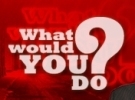What Would You Do?

I really love What Would You Do. For those of you who haven't had the opportunity to watch, it's a hidden camera show, reminiscent of Candid Camera (boy did I really date myself there), that has unsuspecting people witness questionable acts and situations, and then the viewers get to see how they react. Will they turn a deaf ear and blind eye and just walk away or will they confront the offender and speak up? I've watched this show in disbelief as people stand back and say nothing while witnessing a man put an unknown powdered substance in his blind date's drink, a drunk get into her car with her children and drive away, a group of kids gang up on another child, a man verbally abuse his girlfiend, and even a stranger approach a little girl in a public park and lead her away. Unbelievable. Or is it? We live in a world where people just don't want to get involved. It was only a year or so ago when neighbors ignored the screams of a NYC woman being stabbed to death in her apartment. They acknowledged hearing the screams, but did nothing. It's called bystander apathy, and maybe we've always suffered from this as a society because the same thing happened in Queens back in the 60's when 38 people actually stood and watched a woman being chased down and stabbed by her boyfriend. I don't know if it's our fear that the offender will retaliate against us, which sometimes does happen, or if it's just plain old apathy or severe conflict avoidance. Whatever it is, it's very real and very present.
In the world of competitive dog sports and training, I find myself faced with these moral dilemma-type situations fairly often. While I consider myself a pretty assertive person, like most everyone else I just want life to go smoothly without conflict and I do try to mind my own business. I really do hate when things get ugly and I try my best to avoid being that woman. You know, the one waving her finger, head swaying side to side, shouting in someone's face. My mother raised me better than that. But by the same token, I really, really, really hate regret and guilt. For me, thinking about shoulda, woulda, couldas can be very painful. I hate looking back on situations and thinking I should have said something but didn't, so I really do try to speak up as tactfully as I can. Like the time when I was waiting with other handlers behind a curtain while our dogs were performing the out of sight stays and a little Sheltie laid down during the long sit with about 2 minutes remaining. Her handler quickly proclaimed, "when I get back in there I'm going to take her out and give her a heck of a correction." As calmly as I could (seriously), I responded, "well unfortunately she won't have any idea why she's being corrected." She came back, "yes she will." I answered, "no she won't," with absolutely no finger in her face or head swaying. And finally she stated, "I've been training for 20 years so don't tell me she won't know what she did wrong." By then the steward returned and led us back into the ring, and sadly I watched that handler drag the little Sheltie outside. God only knows what happened out there.
Why was I the only one to say something to that handler? I'm certain I wasn't the only one who knew about correctly timing reinforcements and punishments. However because I was the only one who said something, that handler likely dismissed me as a buttinsky and know it all. It would have been much more powerful if there'd been three or four of us speaking up. Maybe she would have thought twice about it. Maybe not. But I can honestly say that even though the situation became a little uncomfortable, I'm proud I spoke up ..... for that little Sheltie. This past weekend my club hosted some UKC obedience and rally trials and there were several people who spoke up when witnessing a handler repeatedly correcting her dog with leash corrections so forceful his entire front end came off the ground. Some heard her say she will never come back to trials at our facility again. I sincerely hope the next place she trials she'll be met with more who call her on her behavior. Maybe one day she'll run out of safe and silent places to trial.




